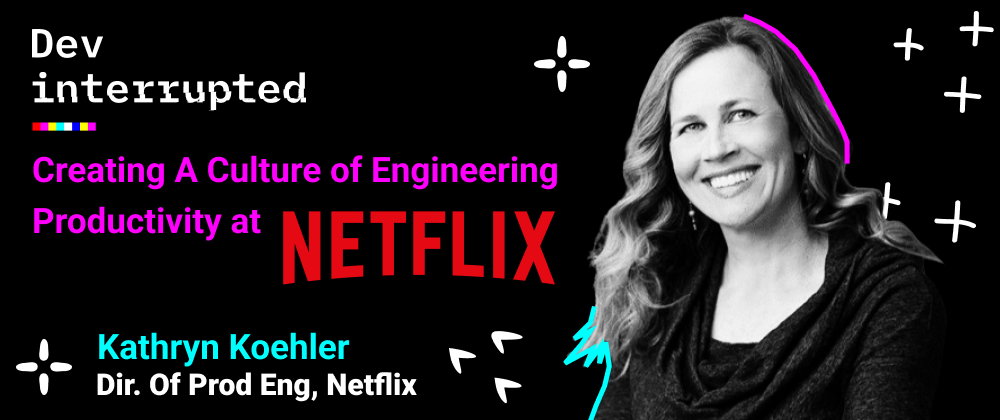This article was written exclusively for Dev Interrupted by Kathryn Koehler
At Netflix, we don’t just think about productivity - we engineer it. There’s an entire team within Netflix dedicated to productivity. I lead the Develop Domain along with my Delivery and Observability Domain peers, and together, we make up Productivity Engineering.
I recently sat down with the Dev Interrupted podcast to discuss all things productivity, how I run my team, and how other managers should view employee success. Here’s how we think about it at Netflix:
Can productivity be engineered?
In short, yes! Productivity is not a generic term for team performance or a perfunctory buzzword used during team meetings. The productivity team is an actual organization. The work we do is foundational to Netflix’s development teams. Productivity Engineering lives within the broader, central Platform organization.
The role of the Productivity Engineering team is simple: we exist to make the lives of Netflix developers easier. Abstracting away the various “Netflix-isms” around development, delivery, and observability, productivity allows devs more time to focus on their domain of expertise.
“We are sort of like the nerds’ nerds, if you will, enabling them to use our platforms and tools so that the work that they're doing is focused on studio and streaming, without thinking about everything that's under the hood.” On the Dev Interrupted Podcast at 2:31
With the recent addition of Gaming to the list of Netflix’s pursuits, the resulting focus becomes even more important.
Practically speaking, it’s the role of Productivity Engineering to help with things like coding, testing, debugging, dependency management, deployment, alerting, monitoring, performance, incident response, to name a bunch. Netflix utilizes the concept of a “paved road,” the frameworks, platforms, apps, and tools we build and support to keep our devs rolling. The idea is to keep workflows streamlined and enable developers to operate as efficiently and effectively as possible. If the road ahead is cleared of obstacles, you’re going to get to where you need to go faster and with support along the way.
It’s also about helping developers enjoy the ride. To abuse another metaphor, a sound engineering experience should be like dining at a fine restaurant. If done right, you rarely remember the waitstaff, have a hard time finding something you like, or worry about how they prepared the food; you simply enjoy the experience. If Productivity Engineering is doing their job, they act as the restaurant and waitstaff with developers as the customer, providing nothing short of a beautiful end-to-end experience.
Measuring Outcomes vs. Output
Measuring all of that productivity can be hard, and there’s no one unicorn measurement to rule them all. Hence, developer productivity teams should focus on impact and outcomes. Above all, Netflix focuses on customer satisfaction. Our philosophy is that while how something is delivered is important, the impact of what’s delivered is ultimately of greater importance.
"If you're running around a track super-fast, but you're on the wrong track, does it matter? So really, what are you delivering? How you're delivering is important. But if that thing that you're delivering is ultimately doing what you want it to do, that's the most important thing." - On the Dev Interrupted Podcast at 5:05
In this model, the outcome always wins over output or activity. For instance, standard productivity deployment metrics (DORA) as applied to our customers become an important proxy for measuring our success. Key Performance Indicators (KPIs) for productivity are viewed as a reflection of a team’s performance as it relates to customer satisfaction.
I’m a big fan of the SPACE framework, developed by Nicole Forsgren, for precisely this reason. How are our customers doing in terms of Satisfaction, Performance, Activity, Communication, and Efficiency? The answer to those questions reflects how we’re doing as a Productivity organization.
"This is our strategy, these are our hypotheses around, how we're going to improve our customers' productivity. Are those things paying off? And if you can't measure them in some way, who knows? Right? So yeah, we're getting a little more hardcore about this." - On the Dev Interrupted Podcast at 24:17
Key metrics provide productivity teams with a holistic view of performance by establishing benchmarks. Understanding that everything needs to be viewed within the proper context, it’s difficult to improve as an organization if nothing is measured or tracked.
Comparing Productivity
Comparing developers’ productivity across teams is a thorny subject at best and downright dangerous for team morale at worst. As the old saying goes, “Comparison is the thief of joy” or what I typically say, “comparisons lead to unhappiness”, or with my kids “eyes on your own paper!”.
The productivity teams at Netflix take a contextualized view of dev teams rather than relying solely on raw data. Every project is different, the customer base is different, the use case is different, personas are different, and where a team is within the software development life cycle is different.
It’s a basic understanding that comparing apples to oranges is not good math. A team that is just starting out and building something new, is going to look very different than a team with a mature product. By recognizing this, it becomes almost impossible to rank teams against each other because very rarely, if ever, will teams be doing the same thing, in the same space, the same way, with the same people.
Even a measurement of an outcome pertaining to customer satisfaction (CSAT) is not straightforward. At Netflix and across the industry, we’ve found that satisfaction for internal teams skews lower than satisfaction for customer-facing teams.
The reason? Teams within Netflix are their own harshest critics. When attempting to gauge the performance of an internal team vs a customer-facing team, it’s understood that the internal team is almost always going to score lower on satisfaction, even if both teams are equally effective.
Context is everything. Measuring productivity means being mindful of context.
Pushing Productivity
Any company that wants to be successful must understand how to measure its success. Productivity doesn’t count for much if an organization is not moving towards desired outcomes.
By viewing productivity as more than just a concept or a raw set of data, the hard-working teams at Netflix have turned productivity into an actual apparatus. It is a living, breathing team of human beings whose devotion to empathetic efficiency improves customer satisfaction and dev team quality of life. I am incredibly proud to lead these teams, and I sincerely hope the work we do inspires other organizations to improve their developers’ experience.
And if you want to be as productive as Netflix, remember that metrics are only as good as their context!
If you enjoyed this article and you would like to learn more about the work that I do at Netflix, I invite you to come join me at INTERACT on April 7th.
This will be the second time that I have sat down for a panel discussion hosted by Dev Interrupted. I love being a member of the Dev Interrupted community because they are such an amazing resource. If you are a team lead, engineering manager, VP or CTO looking to improve your team, come to INTERACT and check out the community - I promise you will learn something.
Pretend you are watching your favorite show on Netflix: Sit back, relax & watch as I share the stage with other amazing engineering leaders from places like Slack, Stack Overflow, American Express, Outsystems, Drata & many more.







Top comments (3)
Awesome!!
Kathryn seems like a great manager. Makes sense. I'm sure Netflix only hires the best.
Looking forward to INTERACT!!!